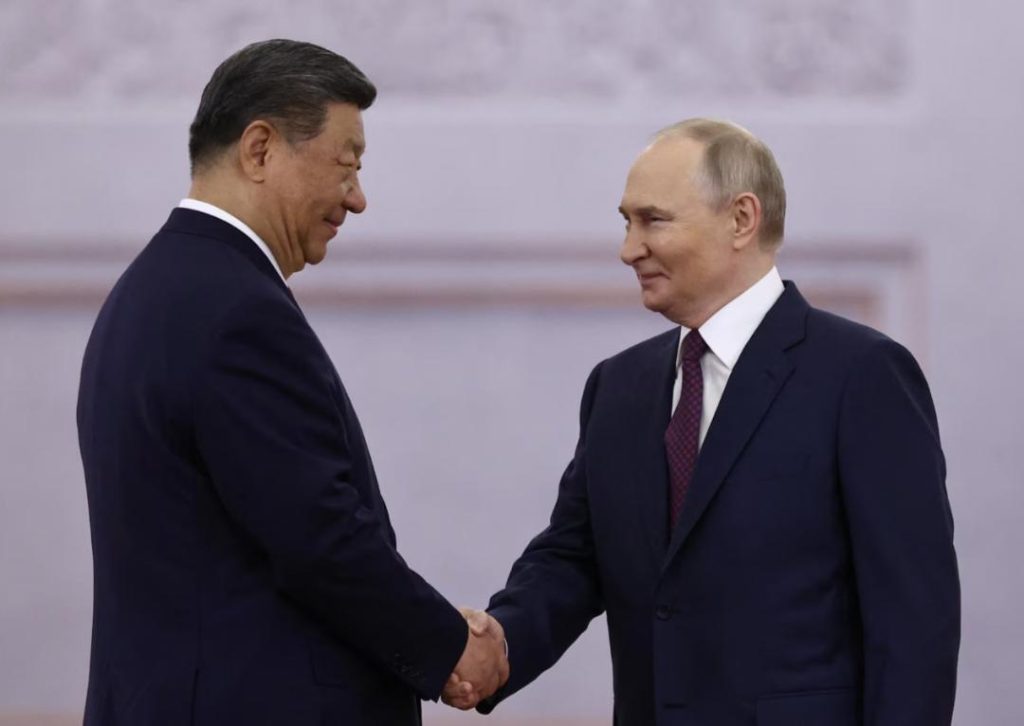
Russia & China Stand United Against Neo-Nazism: Vladimir Putin
On May 8, 2025, Russian President Vladimir Putin welcomed Chinese President Xi Jinping to the Kremlin to commemorate the 80th anniversary of the Allied victory over Adolf Hitler in World War II. The historic meeting marked a significant moment of unity between the two nations, as they jointly condemned neo-Nazism and fascist ideologies.
In a speech delivered during the ceremony, Putin paid tribute to the sacrifices made by soldiers and civilians during World War II, describing the victory as “sacred” and “of lasting significance.” He also extended his gratitude to Xi for joining him in commemorating this milestone event.
“The victory over fascism, achieved at the cost of enormous sacrifices, is of lasting significance,” Putin emphasized. “It is a testament to the bravery and unity of the Soviet people, and it has become a cornerstone of our shared values and principles.”
Xi Jinping, in his remarks, echoed Putin’s sentiments, highlighting the importance of remembering the past to build a safer and more peaceful future. He praised the Soviet Union’s role in defeating Nazi Germany and emphasized the need for continued international cooperation to combat modern-day threats.
The meeting between Putin and Xi was significant not only because of the historical context but also due to the current global political climate. The rise of neo-Nazism and far-right ideologies in various parts of the world has become a major concern for many nations. Russia and China, as two of the world’s most powerful nations, have been vocal in their opposition to these ideologies and have taken concrete steps to counter them.
In recent years, Russia has taken a firm stance against neo-Nazism, condemning its ideology as “absolutely unacceptable” and working to prevent its spread. The country has also strengthened its laws and institutions to combat hate crimes and discrimination.
China, too, has been actively combating neo-Nazism and other forms of extremism. The Chinese government has implemented various policies to promote social stability and has taken measures to prevent the spread of extremist ideologies.
The unity between Russia and China against neo-Nazism is significant because it sends a strong message to the world: that these ideologies are not tolerated and will not be allowed to flourish. The two nations have a long history of cooperation, and their joint condemnation of neo-Nazism is a testament to their commitment to promoting peace, stability, and human rights.
The meeting between Putin and Xi also highlighted the importance of international cooperation in addressing global challenges. World War II was a global conflict that required the collective efforts of nations to defeat a common enemy. Today, the fight against neo-Nazism and other forms of extremism requires a similar level of international cooperation.
Russia and China have a key role to play in this fight. As two of the world’s most influential nations, they have the ability to shape global events and promote positive change. Their joint condemnation of neo-Nazism sends a powerful message to the world and serves as a reminder that these ideologies are not acceptable.
In conclusion, the meeting between Russian President Vladimir Putin and Chinese President Xi Jinping was a significant event that marked a new era of cooperation between the two nations. Their joint condemnation of neo-Nazism and fascist ideologies is a powerful message to the world, and it serves as a reminder that these ideologies are not tolerated and will not be allowed to flourish.
Source:
https://www.reuters.com/world/europe/putin-greets-chinas-xi-kremlin-2025-05-08/



